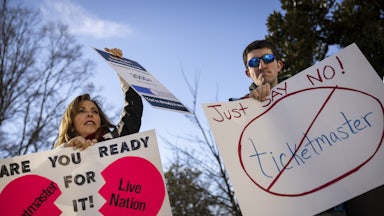With Labor Day approaching, President Joe Biden and his administration will no doubt be out in force, touting their pro-worker bona fides. Among the executive and administrative agencies trumpeting themselves as a friend to working people will be the Federal Trade Commission. This is something of a sea change: For decades, the FTC ignored the domination of workers by employers and even thwarted organizing by independent contractors. It infamously sued the public defenders of Washington, D.C., in 1983 for going on strike and sided with Uber against rideshare drivers in 2017.
But under Chair Lina Khan, the FTC has pledged to change course. The agency has consistently indicated it wants to protect workers from corporate power. In what is probably a first for a sitting FTC chair, Khan even visited a picket line to speak with striking members of the Writers Guild of America. Given its authority to police “unfair methods of competition,” the FTC has broad power to build a more just economy—a power it recognized and promised to use in a policy statement published last November.
But as encouraging as the FTC’s change of heart has been, its achievements for labor, more than two years into President Biden’s first term, fall short of these lofty ambitions. Earlier this year, the FTC proposed to outlaw noncompete clauses for all workers. Alas, it was but a proposal. Now it must defy heavy pressure from industry and issue a final rule that outlaws noncompete clauses and other functionally similar contracts.
There’s more work to be done beyond this. The FTC should target the use of contracts by McDonald’s, Amazon, and Uber that these firms deploy to control independent business proprietors and workers in order to convert them into effective employees—but without the rights and protections of employment. And as strike season winds on, the FTC should break with its union-busting past and state clearly that it will not interfere with organizing by any class of workers, regardless of whether they are employees or independent contractors. In short, the FTC has the authority to do more. There’s no reason it should keep its powder dry.
Credit where credit is due: The FTC has already nudged a handful of firms in the right direction, ending the practice of ensnaring their employees into noncompete agreements. But the agency can follow through on its commitment by banning noncompete clauses for all workers. (The Open Markets Institute, where we both work, led a labor and public interest coalition that petitioned the FTC for this rule in spring 2019.) Noncompetes currently bind tens of millions of workers, across all occupations and income levels. Importantly, rather than a partial ban protecting only a subset of workers based on their line of work or earnings, the FTC proposed to outlaw these contracts for everyone, regardless of whether they are employees or independent contractors or whether they are high-income or minimum-wage workers.
The FTC received more than 20,000 comments from the public—comments that appeared to be generally supportive of the proposed ban. But not everyone was pleased: The U.S. Chamber of Commerce, speaking for many employers, pledged to sue the FTC if it proceeded to finalize the rule.
Notwithstanding the Chamber’s bluster, the FTC must press on and enact the rule as quickly as possible; it’s a vital step toward delivering the kind of labor economy President Biden has envisioned. Abolishing noncompete clauses would allow workers to leave abusive and discriminatory work environments, accept more rewarding jobs, and start their own businesses.
At a time when workers have won unprecedented wage gains by switching jobs in a tight labor market, tethering workers to their current employer is especially pernicious. Critically, the FTC must prohibit both conventional noncompetes and the noncompete-like facsimiles that firms often use. For instance, it must categorically outlaw restraints such as so-called training repayment agreement provisions, or TRAPs, that compel workers to pay their employer substantial amounts of money in the event they leave.
In addition, the FTC should use its statutory powers to rein in mistreatment of workers in the so-called “gig economy” and other “fissured” workplaces, where employers disclaim employment responsibilities for workers they control. Since the late 1970s, corporations have exploited revised judicial interpretations of the Sherman Antitrust Act to replace formal employment relationships with restrictive contracts known as “vertical restraints” that they impose on nominally “independent” contractors.
These contracts, which dictate matters such as what prices workers and proprietors can charge, what customers they can serve, what products and services they must offer, and more, allow companies like Subway, Uber, and Amazon to gain employment-like control over sandwich shop workers, taxi drivers, and delivery workers—while denying those workers their rights as employees, including minimum wages, overtime, and the freedom to unionize.
While the FTC has issued a policy statement on the app-based gig economy, which nodded at the issue of misclassification and fissuring through restrictive contracts, it largely declined to directly regulate those contracts. Instead, the agency emphasized greater disclosure of costs, pay, and algorithmic decision-making processes. But workers who are more informed about the terms of their exploitation are still exploited. Moreover, the extent of fissured workplaces goes far beyond the app-based gig economy. Although the FTC in March put out a request for information to learn about the use of restrictive contracts to control and abuse independent workers and business owners in other sectors, like the franchising industry, it has thus far neither initiated rulemakings nor brought enforcement actions.
The FTC could directly attack the types of contracts underlying these control-without-responsibility business models. To start with, the FTC should ban exclusionary contracts by dominant firms. These are contracts that tie a business or independent worker to serve a single company, like Uber limiting a taxi driver’s opportunity to drive for other dispatchers, or Amazon preventing subcontracted delivery companies from seeking bids from other customers, taking away their independence. In July 2020, the Open Markets Institute, with more than 30 coalition partners, petitioned the FTC to restrict these contracts.
Beyond exclusionary contracts, the FTC should use lawsuits and rulemaking to curtail other coercive contracts that hurt workers. So-called “vertical” no-poach agreements, in which one company, such as a fast-food chain, requires its contractors or franchisees to refrain from recruiting or hiring the workers of other franchisees, are one example. These agreements significantly depress wages. Such no-poach agreements could be more firmly confronted by incorporating them into the final noncompete rule—or challenged through enforcement actions since they may be already illegal under the Sherman Antitrust Act.
Other pernicious contracts between businesses similarly restrain worker mobility and suppress pay. For example, some contracts between building owners and service contractors bar workers from continuing to work for that building owner if their employer’s contract is ever terminated, unless the building owner pays a large fee. And if workers want to quit working for that contractor, they must find a job with no affiliation to their current building. As with no-poach agreements, workers are not even a party to these contracts—they just have their employment options limited by them. The union SEIU 32BJ brought just such a contract to the attention of the FTC in April 2022, filing a complaint seeking enforcement against this unfair and coercive practice. Over a year later, the FTC has not taken any action.
Finally, this would be an ideal moment for the FTC to make a clean break with its union-busting past. In a betrayal of the animating purposes of the antitrust laws, the FTC for decades attacked collective action by professionals and independent contractors. The FTC applied a narrow interpretation of antitrust law’s labor exemption and took the position that only workers in traditional employment relationships had the right to organize without violating antitrust rules.
In 1983, the FTC sued public defenders in Washington, D.C., for striking over their poor pay. The FTC litigated the case up to the Supreme Court, which decided in favor of the FTC and concluded the strike was an illegal restraint of trade. In the 2000s and 2010s, the FTC sued doctors, ice skating coaches, music teachers, and, yes, even church organists for concerted action. In 2017, the FTC, along with the Justice Department, filed an amicus brief in support of the Chamber of Commerce’s lawsuit against Seattle challenging the city’s law granting collective bargaining rights to ride-hailing drivers.
The FTC must commit to respect workers’ ability to organize and stop being an impediment to worker power. This step would be faithful to the law: In 2022, a federal court of appeals in Boston recognized that the antitrust statutes protecting workers’ ability to organize—the Clayton and Norris-LaGuardia Acts—say nothing about excluding independent contractors. They are broadly drafted laws and restrict judicial interference with organizing activities by all workers.
To their credit, two of the three FTC commissioners publicly stated that they believe all independent contractors should have the ability to organize under the current antitrust laws, and Khan called for legislation to protect their right to organize in a September 2021 letter.* Now the FTC must clearly and unequivocally state that all workers can form unions, collectively bargain, and strike without fear of antitrust investigations and suits. In partnership with the DOJ, it should urge the federal judiciary to apply the labor exemption to all workers.
Under the Biden administration, the FTC has taken many promising steps in the direction of breaking with its unsavory recent past, on the way to becoming a genuinely potent pro-worker agency. But many of those steps have been in the form of proposals, policy statements, and rhetorical shifts. That is a good start. But more than two years into President Biden’s presidency, time is running short. To earn its place as the first pro-worker FTC in decades, the agency should etch this lofty rhetoric into its foundation and, with a purposeful commitment, match those words with deeds.
* This article originally omitted Khan’s September 2021 letter.










